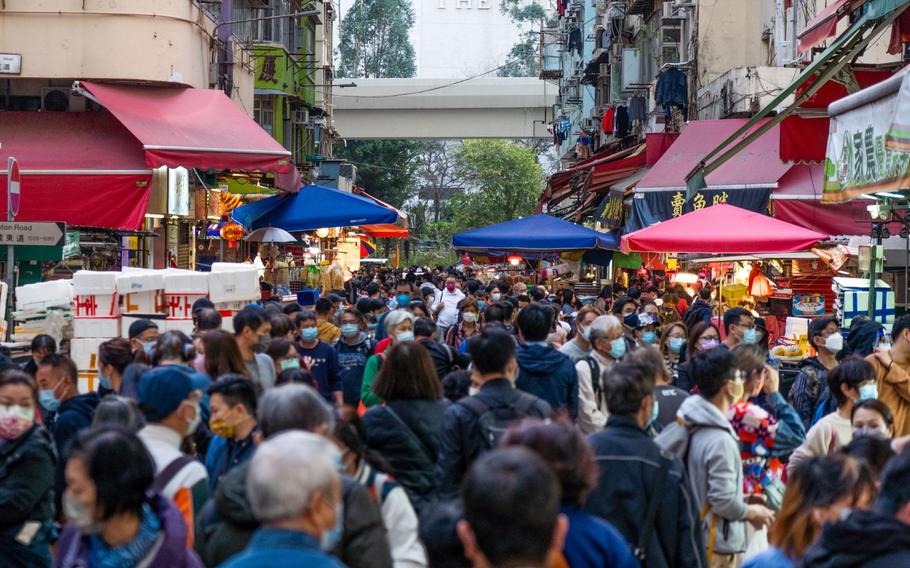
Crowds are seen at a wet market in Hong Kong on Feb. 28, 2022. (Bertha Wang/Bloomberg)
Stars and Stripes is making stories on the coronavirus pandemic available free of charge. See more stories here. Sign up for our daily coronavirus newsletter here. Please support our journalism with a subscription.
One by one, Hong Kong's government is being forced to move away from key pillars of its strict COVID Zero strategy as a surge in new cases overwhelms the under-prepared health-care system.
Patients with mild cases are no longer sent to hospital or isolation facilities as there's no space; instead they're asked to stay home until they test negative with rapid antigen tests — which people often need to buy themselves.
Close contacts, no longer identified by the city's elaborate contact tracing process, are moving around freely though they're technically supposed to home quarantine for at least a week. The app used to flag locations with confirmed cases has suspended risk alerts. Gold-standard lab tests have been largely dropped, with at-home rapid tests taking their place.
This rapid erosion of core COVID Zero practices shows the difficulty of maintaining an approach that seeks to wipe out the virus when faced with more infectious strains like omicron.
Hong Kong reported a record 34,466 new cases on Monday and 87 deaths, making the outbreak much bigger than any the zero-tolerance approach pioneered by China has ever quelled. Hospitals are inundated and the city's morgues are nearly full, with bodies of those who died from COVID left in emergency wards and hallways.
Deaths are climbing because the elderly lack protection via vaccines. Less than a third of those aged 80 or above have had two doses.
In another concession, the government said Monday that international schools would be able to maintain their original academic schedule. Officials last week announced plans to bring forward summer holidays as they seek to use school campuses as testing sites.
Officials maintain that the recent relaxations are just temporary, until isolation and testing capacities are beefed up with China's help.
Beijing is sending in Liang Wannian, the leader of its pandemic response since the first outbreak in Wuhan. It's also funding the swift construction of makeshift hospitals and quarantine centers. Compulsory mass testing, essential to rooting out cases on the mainland, gets underway next month. But it remains to be seen whether these measures can eliminate a surge of this magnitude.
Publicly, Hong Kong is steadfastly committed to COVID Zero, or the "dynamic zero" strategy, as Beijing has started calling it. Border restrictions and mandatory traveler quarantines — the most obvious hallmarks of the policy — remain firmly in place, isolating the financial hub from the rest of the world even though just seven of Sunday's infections were imported cases. Flight bans on nine countries, including the U.S. and U.K., have been extended until late April.
Under the latest government guidelines, newly infected people are free to leave their homes once they test negative twice, provided they've received at least two doses of a COVID vaccine. That can be as soon as a week after first testing positive. There is currently no way for infected people to report results using rapid tests to the government, although officials are working to roll out an online reporting system this week. Measures like electronic tracking bracelets may be introduced, according to local media reports.
The government's pandemic adviser David Hui urged residents to stock up on medical supplies such as Panadol and rapid test kits, the South China Morning Post reported. Yet pharmacies are running out of flu and cold medicines.
In many ways, Hong Kong is living with the virus in the same way ex-COVID Zero adherents Singapore, Australia and now New Zealand are — based on the case numbers and the way tracking methods are being relinquished. The difference is those places made a concerted and well-telegraphed pivot to the endemic path, one that Beijing has — so far — refused to do.